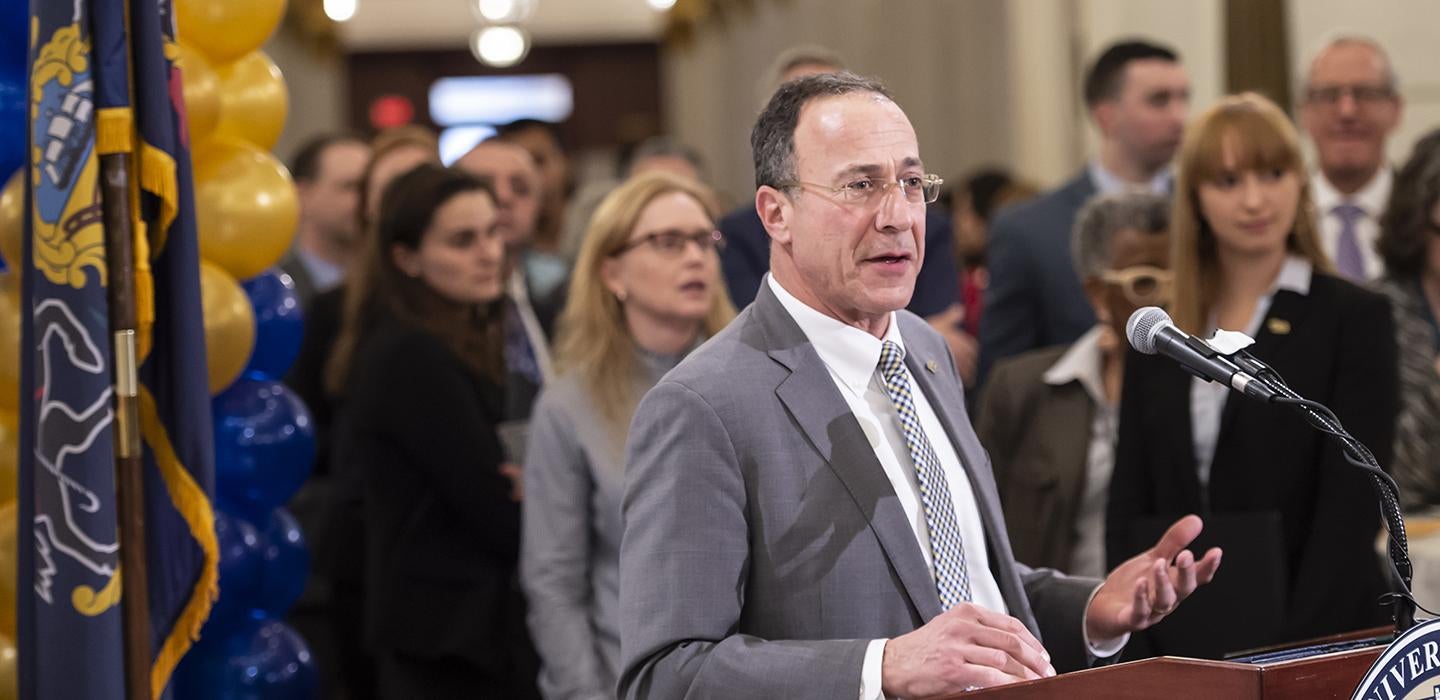
Subscribe to Pittwire Today
Get the most interesting and important stories from the University of Pittsburgh.Earlier this month, Pennsylvania Gov. Tom Wolf gave his annual budget address before a joint session of the state House of Representatives and Senate marking the unofficial start of budget season for the commonwealth. It’s the state’s budget that directly funds a tuition discount for in-state students and families at the University of Pittsburgh.
The budget will navigate its way through the legislature, with a June deadline to pass. It’s a complex process — and one that students may not be aware has a big impact on their education.
Paul Supowitz, vice chancellor of community and government relations, helps track and explain this unique process. He also is the University’s liaison with Harrisburg, educating legislators about Pitt’s academics, research and community service — in other words, he shares Pitt’s impact across Pennsylvania.
Pittwire asked Supowitz to explain what the Pitt community needs to know about this year’s budget process, what’s at stake and how you can help.
How does the state budget impact Pitt?
State budget decisions have a direct and immediate impact on Pitt students and families who call Pennsylvania home. Every year, lawmakers must choose to fund a tuition discount for in-state students and their families. This discount is significant — saving Pitt students and families throughout the commonwealth more than $15,000 in tuition costs each year.
Isn’t the in-state tuition discount automatic for Pennsylvania students?
Unfortunately, no. Lawmakers must vote on this issue every year. And so, every year, Pitt students and Pennsylvania families are at risk of losing this powerful, life-changing benefit.
Gov. Tom Wolf just announced his budget — what happens next?
The governor released his budget proposal on Feb. 8, and he called for increasing the state’s investment in education. This is a good first step — but it’s a long budget process, and the deadline to pass the state’s final budget is June 30. Pennsylvania lawmakers ultimately get the final say, and this includes voting yes to funding an in-state tuition discount for Pitt students.
[Want to learn more? Here’s in-depth explanation of the state budget process.]
From now to June 30, the Pitt community is going to stay busy advocating on behalf of Pennsylvania students and families. In March, Chancellor Patrick Gallagher will appear before the Senate and House appropriations committees to answer questions from lawmakers and speak to the importance of supporting Pennsylvanians in accessing and affording a world-class Pitt education.
In the coming weeks and months, we’ll be advertising a number of ways that Pitt community members can get involved and help protect and preserve this critical benefit for Pennsylvania’s students and families.
I don’t want to wait. Can we start helping now?
State officials are always eager to hear from the students and families they represent. If you are a Pennsylvania resident, consider reaching out to the lawmakers in your home district and urging them to protect and preserve the in-state tuition discount for Pitt students.
Another option is to join our Pitt Advocates network. This is a group of Pitt alumni, faculty, staff, students and friends who are interested in staying informed and advocating on behalf of our University community and its members.
A third option is to participate in Pitt Day in Harrisburg on March 29. This event, just like its name suggests, brings Pitt community members and lawmakers together for the day. It’s a great way to visit the Pennsylvania State Capitol. But, even more important, it’s an opportunity to connect directly with elected officials and discuss specific issues — like protecting the state-funded tuition discount — that are important to you. Details for the event will be released soon.
Building a brighter Pennsylvania
The University of Pittsburgh is a top-ranked public university in the commonwealth, educating about 20,000 Pennsylvanians and injecting an estimated $4.2 billion into the state each year. Pitt is also a national leader in academic excellence and biomedical research — maintaining a top spot in research funds received from the National Institutes of Health — and a proud community anchor, transforming local lives and communities with its mission of creating and leveraging knowledge for society’s gain. Read more about Pitt’s contributions to the commonwealth.


